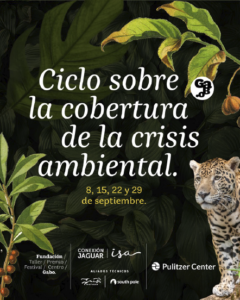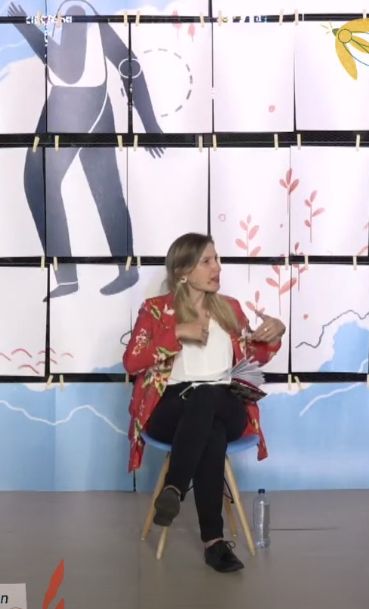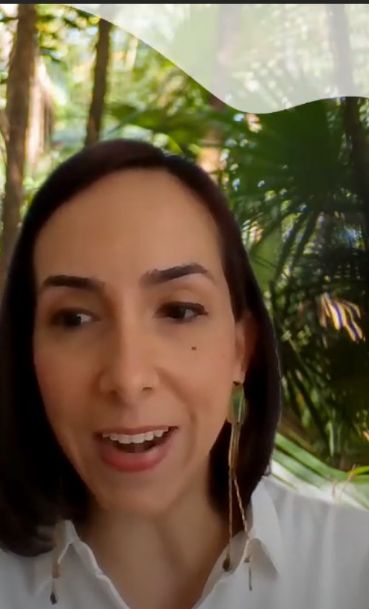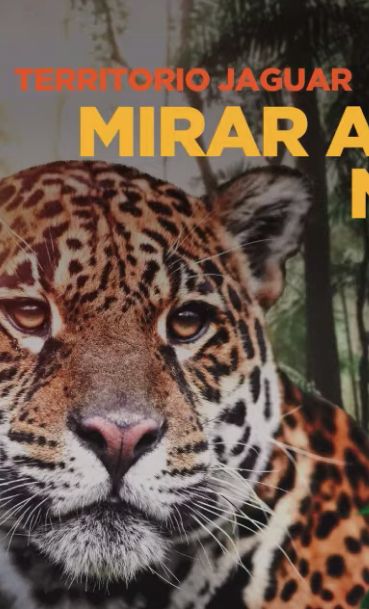The alliance comprises a series of four open and online seminars, which will be available in Spanish and English, with 16 journalists from 11 countries, who will provide tools for better coverage of environmental matters.


Fundación Gabo has formed an alliance with Grupo ISA and the Pulitzer Center on Crisis Reporting in the United States in order to promote a journalism committed to the environment, capable of placing this topic on the global agenda.
The alliance aims to offer tools and resources that allow for quality coverage from a global perspective-understanding that the environmental topic is something that concerns everyone and that goes beyond regions and borders-and adapted to the new context proposed by COVID-19, on matters such as the protection of biodiversity and wildlife, corruption behind environmental threats and the environmental challenge seen from the perspective of indigenous communities of the Amazon.
To this end, the alliance contemplates the development of a series of four bilingual and open online seminars that will promote the exchange of experiences and knowledge among journalists, activists, and citizens from different parts of the world who have conducted research on environmental matters.
The cycle seeks to reinforce the scope of the Conexión Jaguar program of ISA, a multi-Latin group that operates in Colombia, Brazil, Chile, Peru, Bolivia, Argentina and Central America in the energy, roads, telecommunications, and ICT sectors. Conexión Jaguar is the corporate sustainability program through which ISA and its technical allies, South Pole and Panthera, contribute to biodiversity conservation and climate change mitigation, together with the rural communities in the territories where the company operates.
Fundación Gabo will program the cycle together with the Pulitzer Center, a non-profit organization that supports independent journalism internationally and encourages coverage of underreported matters in the media. Comprised of four 75-minute open webinars, the series will feature 16 panelists from Colombia, the United States, Bolivia, Brazil, Peru, Paraguay, Venezuela, South Africa, Uganda, India, and Indonesia, including experts in environmental coverage who have been Pulitzer Center Fellows, Premio Gabo finalists and Fundación Gabo teachers.
The seminars will take place throughout September and will be conducted in Spanish and/or English (with simultaneous translation). These are the topics that the talks will address:
Innovative narratives and partnerships to cover biodiversity: Journalists who have created projects and news partnerships with new narrative strategies will share how this has scaled their environmental stories and their impact.
Date: September 8, 2020.
Time: 11 am (COL/ MEX) – 12 m (Washington DC) – 1 pm (BRA/ ARG) – 6 pm (ESP).
Registration link in English: https://www.eventbrite.co/e/118703065063
Registration link in Spanish: https://www.eventbrite.co/e/118495189301
To tell and make visible the environmental challenge from the stories of indigenous communities: The work of journalists who cover the threats faced by indigenous communities-such as pandemics, environmental change, and the exploitation of heritage by external actors-will be examined, as they make visible the evolution of their stories and the adaptation of these communities.
Date: September 15, 2020.
Time: 11 am (COL/ MEX) – 12 m (Washington DC) – 1 pm (BRA/ ARG) – 6 pm (ESP).
Registration link in English: https://www.eventbrite.co/e/118703249615
Registration link in Spanish: https://www.eventbrite.co/e/118552017275
To tell and make visible the environmental challenge from the stories of indigenous communities: The work of journalists who cover the threats faced by indigenous communities-such as pandemics, environmental change, and the exploitation of heritage by external actors-will be examined, as they make visible the evolution of their stories and the adaptation of these communities.
Date: September 15, 2020.
Time: 11 am (COL/ MEX) – 12 m (Washington DC) – 1 pm (BRA/ ARG) – 6 pm (ESP).
Registration link in English: https://www.eventbrite.co/e/118703249615
Registration link in Spanish: https://www.eventbrite.co/e/118552017275
Local alternatives for global impacts: A dialogue will be conducted on how to cover and tell the stories of effort and resistance of community projects in a globalized world, what is the role of communities in the fight against environmental threats and what are the consequences of initiatives that aspire to sustainability.
Date: September 29, 2020.
Time: 11 am (COL/ MEX) – 12 m (Washington DC) – 1 pm (BRA/ ARG) – 6 pm (ESP).
Register here.
Registration link in English: https://www.eventbrite.co/e/118703466263
Registration link in Spanish: https://www.eventbrite.co/e/118565000107
About the Pulitzer Center
The Pulitzer Center, founded in 2006 and based in Washington, D.C., has become a major source of support for far-reaching, agenda-driven journalism on global issues, and an innovative leader in working with schools and universities to bring those issues into classrooms around the world.
The Pulitzer Center supports more than 150 journalism projects a year. Its work with the Associated Press covering the war in Yemen won a Pulitzer Prize for international reporting. Pulitzer Center projects have been among the winners in the past three years of RFK and Overseas Press Club awards; the Pulitzer Center itself has been honored for its online reporting by the National Press Foundation, the National Press Club, and the Society of Professional Journalists.
About Fundación Gabo
Fundación Gabo is an institution created by Colombian journalist and Nobel Prize winner Gabriel García Márquez. Since 1995, it has organized workshops, awards, scholarships, publications and has led initiatives to transmit to new generations Gabo’s dream of doing the best journalism in the world: an independent journalism that seeks to investigate, decipher, and explain reality in a rigorous, ethical, and creative way, so that citizens are better informed. In its mission to promote better journalism and Gabo’s legacy, Fundación Gabo leads initiatives such as the Gabo Festival, the Gabo Award, and the Gabo Center.




